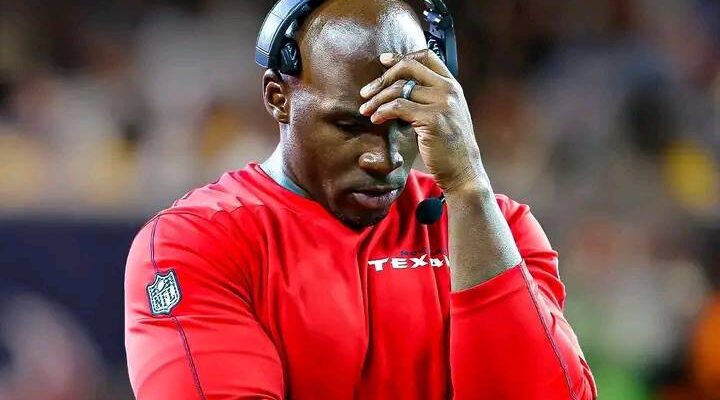HOUSTON, WE HAVE A LEADER: How DeMeco Ryans Subtly Made the Texans a Real Contender Instead of a League Afterthought
In the vast and unforgiving landscape of the NFL, some franchises seem perpetually caught in a cycle of disappointment. The Houston Texans, a relatively young franchise birthed in 2002, have long flirted with promise but often fell short of sustained success. Yet, in recent years, a quiet revolution has taken place in Houston—one led not by flashy headlines or dramatic moves but by steady leadership and cultural change. At the center of this transformation is DeMeco Ryans, a former linebacker turned head coach, whose understated approach has turned the Texans from league afterthoughts into real contenders. And somehow, despite playoff runs and 22 victories, his coaching brilliance has flown under the radar, leaving him without the recognition — like a Coach of the Year award — that many feel he deserves.
This is the story of how DeMeco Ryans subtly but surely reshaped the Texans, establishing them as a team to watch in the NFL.
When the Texans hired DeMeco Ryans as their head coach, many NFL observers were intrigued but skeptical. Ryans, a former defensive player with a brilliant career as a linebacker, had impressed as a defensive coordinator with the San Francisco 49ers. But could a first-time head coach lead a franchise mired in underachievement to respectability?
What Ryans brought to Houston was a blend of humility, discipline, and a fierce football intellect. From the outset, it was clear he wasn’t here to make noise — he was here to build something lasting. His leadership style was quiet but firm, focused on accountability and team-first principles. He earned respect from players and staff alike by embodying the work ethic and professionalism he demanded.
One of the most profound impacts Ryans had on the Texans was cultural. The Texans’ previous years were marked by inconsistency, locker room unrest, and a lack of identity. Ryans, however, instilled a culture of discipline and collective responsibility.
He emphasized “the process” — the daily work, the preparation, and the small habits that add up to winning football. Practices became more focused, meetings more purposeful. Players felt the difference immediately. Veterans praised Ryans for his clear communication and respectfulness, while young players flourished under his guidance.
Importantly, Ryans created an environment where accountability was mutual. Coaches owned their mistakes, and players knew they were expected to be professionals on and off the field. The Texans stopped being a team where excuses were tolerated and instead became one where effort and execution were paramount.
DeMeco Ryans’ background as a linebacker and defensive coordinator meant defense became a hallmark of the Texans’ identity. Under his watch, Houston’s defense evolved from a liability into a strength.
Ryans implemented a scheme that balanced aggression with discipline. He leveraged player strengths — getting linebackers to roam, defensive linemen to collapse pockets, and secondary players to lock down receivers — all while maintaining strong fundamentals. This defensive mindset helped keep the Texans competitive in close games and was critical in playoff scenarios.
But Ryans didn’t just build a defense; he built a cohesive unit. He emphasized communication, trust, and situational awareness, which allowed the Texans’ defense to adapt fluidly to opponents’ strategies. Over the course of his tenure, Houston’s defense ranked significantly higher in key metrics such as yards allowed, points per game, and takeaways, showcasing measurable progress.
While defense was Ryans’ specialty, his holistic approach ensured the offense also improved. His leadership fostered collaboration between coordinators and players, emphasizing balance and efficiency rather than flashy but inconsistent plays.
Quarterback play stabilized, offensive line performance improved, and the Texans began to feature a diverse, unpredictable attack that kept defenses off balance. Ryans trusted his staff to innovate while ensuring the team maintained discipline in execution. The result was a unit capable of sustained drives and clutch plays that complemented the defense.
Under Ryans, the Texans have compiled 22 wins in a relatively short span — a notable feat considering the franchise’s historical struggles. More importantly, these wins translated into playoff appearances, something that had been elusive for Houston in recent years.
In postseason games, Ryans’ Texans showed grit and poise, often outperforming expectations. This was no accident. It was the culmination of the culture, preparation, and leadership instilled by Ryans and his coaching staff.
While they haven’t yet claimed a Super Bowl title, the trajectory is unmistakable: a team moving in the right direction, built on a foundation of resilience and strategic excellence.
Despite the clear progress and on-field success, DeMeco Ryans has not garnered the widespread accolades one might expect. Not a single Coach of the Year award has come his way, and the national spotlight often misses his quiet brilliance.
Why? For one, Ryans’ style isn’t flamboyant. He doesn’t seek the spotlight, doesn’t engage in headline-grabbing antics, and lets the work speak for itself. In an NFL landscape that often favors drama and personality, Ryans’ humility may work against him in public perception.
Additionally, the Texans as a franchise don’t carry the same media weight or market prestige as teams in New York, Los Angeles, or Dallas. That limits exposure and recognition despite impressive results.
But for those inside the league—players, coaches, analysts—Ryans’ name is synonymous with respect and a new standard of leadership.
The most telling testimony to Ryans’ impact comes from the players. Veteran stars credit him with bringing clarity and structure to a previously chaotic environment. Young players speak of his mentorship and the confidence he instills.
“Coach Ryans demands excellence but treats you like a professional,” one Texans player noted in a recent interview. “You want to work hard for him because he’s genuine, and he cares about our growth on and off the field.”
This mutual respect creates an environment where players buy in fully, fostering cohesion that’s vital for a team’s long-term success.
Leadership is about more than X’s and O’s, and Ryans understands that. He’s become a figure of stability not just within the Texans organization but in the Houston community.
He participates in community outreach, engages with fans, and supports local initiatives. His presence signals that the Texans are committed to excellence both on the field and in the city they represent.
This connection helps build a broader culture of pride and investment around the team, something crucial for sustained success in professional sports.
The future looks bright for Houston. With Ryans at the helm, the Texans have established a strong foundation and a culture primed for growth.
Upcoming drafts, free agency, and continued player development are likely to strengthen the roster. Ryans’ steady hand provides a roadmap for the Texans to evolve into a consistent playoff team and, eventually, a Super Bowl contender.
The hope is that the wider football world will catch on soon, recognizing DeMeco Ryans not just as a promising young coach but as one of the NFL’s elite leaders.
In the NFL, where coaches come and go, and success is often fleeting, DeMeco Ryans represents a rare breed of leader. He didn’t storm into Houston with fanfare or make headlines for bold proclamations. Instead, he built a culture of discipline, transformed a defense, and guided the Texans to meaningful victories and playoff runs.
The fact that Ryans hasn’t yet received a Coach of the Year award is less a reflection of his abilities and more of the subtlety with which he leads. Sometimes, the greatest impact is the one that happens quietly — the kind that changes a franchise from an afterthought into a respected contender.
Houston, indeed, has a leader.



